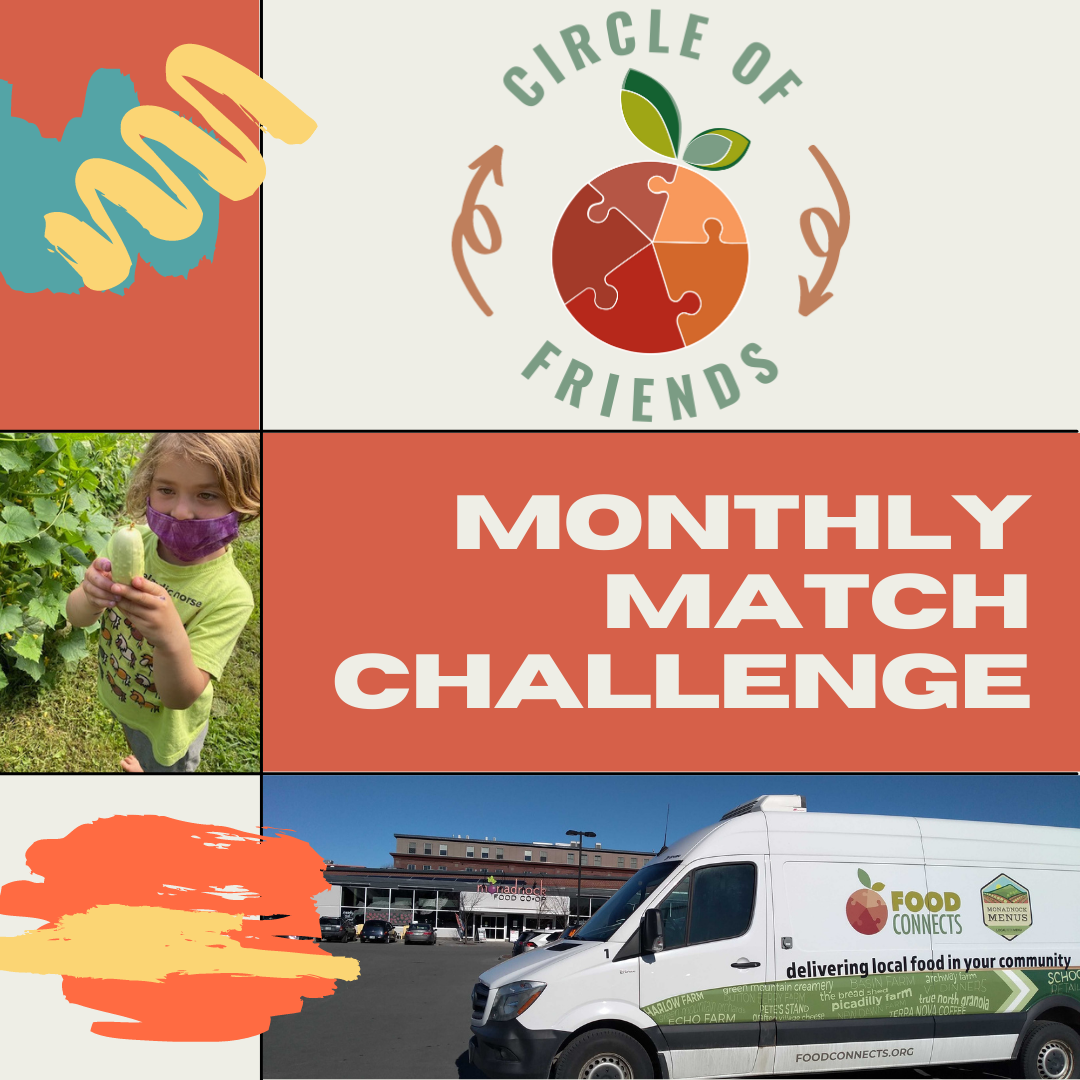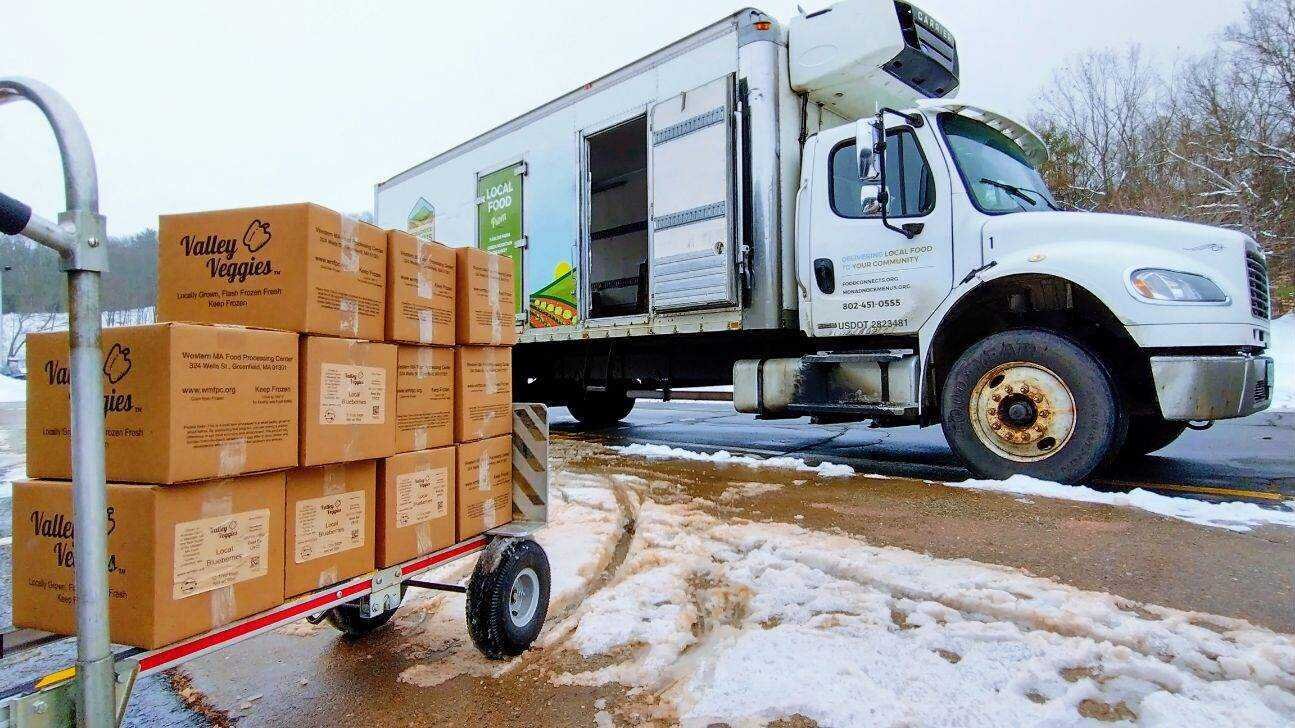Food Connects has so much to celebrate! Not only are we celebrating 10 years of Food Connects, but 2022 was a successful year for our Farm to School and Food Hub programs. We are so grateful to our community for your continued support for Food Connects and our local food economy. Check out our 2022 Annual Report today!
2021 Food Connects Annual Report
Hot off the presses: Food Connects 2021 Annual Report!
Food Connects has so much to celebrate! 2021 was a successful year for our Farm to School and Food Hub programs—we saw tremendous growth and have some great stories to share with you. We are so grateful to our community for your continued support for Food Connects and our local food economy. Check out our 2021 Annual Report today!
October 2021 Quarterly Newsletter
The Taste of Food Connects is Back!
Farm to School Impact Report
Summertime Success
The Recipe Box
Happy Farm to School Month!
FTS Thank You
July 2021 Quarterly Newsletter
2020 Annual Report
Sustaining Donor Challenge
Farm to School Reflections
New England Cheese Hits the Road
Employee Giving Success
Round up For Food Connects
The Monadnock Restaurant Project Receives Praise
2020 Food Connects Annual Report
Hot off the presses: Food Connects 2020 Annual Report!
2020 was a strange year for everyone. And despite the uncertainties and challenges we faced, Food Connects has much to celebrate—from new initiatives and partnerships to innovative Farm to School programming and record Food Hub sales growth. We are so grateful to our community for your continued support for Food Connects and our local food economy.
Keeping Our Families Fed
Farm to School Cafe and Food Connects Feed Families Throughout the Holiday Season
Families in the Windham Northeast Supervisory Union (WNESU) received three free food boxes over the holiday break thanks to the tireless efforts of the Farm to School Cafe staff and farmers throughout the region. The food boxes contained a week’s worth of bulk meal ingredients for breakfast and lunch to help stretch families’ grocery budgets and keep students nourished over the long break. The Farm to School Cafe reached out to Food Connects to fill those boxes as much as possible with high-quality foods from local producers, including fresh NH-made bread, VT cheese and produce, and fresh fruit.
Thanks to numerous USDA waivers in response to COVID-19, universal free meals have been in effect nationwide since last March and schools have been operating under the Summer Food Service Program—which provides higher reimbursement rates per meal for schools. These two changes combined translate to easy to access meals for all students and a reliable revenue stream for school nutrition programs. The holiday food boxes extended that support through the break, all students qualified for this program—each family simply filled out a form for each student so the Farm to School Cafe team knew how much food to order.
“We were inspired by the Burlington School Food Project who blazed the trail on these meal kits,” says Harley Sterling, School Nutrition Director for the WNESU. “And grateful to the Vermont Agency of Education who has been incredibly supportive in developing this program.”
“Many students rely on school meal programs for both nutritious breakfasts and lunches each day during school,” says Conor Floyd, Food Connects Farm to School Program Manager. “When school is not in session, however, a gap in access to nutritious and filling food appears. Programs like the holiday food boxes allow all students in the supervisory union to have the same access to meals throughout school breaks, no matter their family’s income level.”
With increased meal flexibility as a result of the USDA waivers mentioned above, school nutrition programs have piloted new programs, including sending bulk ingredients home with students over extended breaks. These pilots often involve quick turnaround times and last-minute requests. Food Connects’ short supply chain and strong relationships with its producers helped the Farm to School Cafe access source-identified products from VT, NH, and MA on short notice.
"We're just thrilled that these universal meals programs allowed us to give kids and families in our community a little boost, especially this time of year,” says Sterling. “Making sure every kid has access to the great food grown and made in our area has always been our goal, and Food Connects makes it easy by letting us know what products are available and bringing them right to our kitchens."
With less than two weeks between the initial phone call from Sterling and the first delivery, the newly expanded Food Hub team sprang into action. The Food Connects Sales and Procurement Teams worked with Harley to brainstorm and source a variety of food products that:
families would eat but also inspire fun and new cooking ideas,
fell within the required price range,
were kid-friendly and easy for parents to cook, and
were hyper-local—the farthest items traveled only 87 miles while 7 of the 10 farms that provided food are located within 25 miles of Bellows Falls Union High School.
Once the orders were placed, the Food Connects Operations Team activated their network of dedicated drivers and expanded delivery fleet to pick up and deliver these orders—all while navigating their regular order and sales cycle to customers and capping off a record-breaking year in sales with Food Connects’ largest pre-Christmas delivery weeks ever. Although the Food Hub was closed for regular sales during the week of Christmas, the Food Hub staff generously volunteered to pick up extra shifts to ensure the orders made it to Bellows Falls Union High School in time for the Holiday Meal box distribution.
As the Farm to Cafe team kept families fed throughout the holiday season, they also bolstered the local food economy—buying food from 10 Food Connects farms and food producers: Basin Farm, Champlain Orchards, Dutton Berry Farm, Grafton Village Cheese, Green Mountain Orchards, Harlow Farm, Mi Tierra Tortillas, The Bread Shed, Valley Veg, and Yalla Vermont. Over $19,000 was spent at these local food businesses. “This is money that is going straight back into the community,” says McKenna Hayes, Food Connects Food Hub Co-Director, “being paid out to area producers and distribution staff, who in turn use those funds at other local businesses.”
So what did families actually receive? 2,100 pounds of potatoes, 852 quarts of yogurt, about 6,000 apples, 600 pints of cider, 180 bunches of kale, 1,100 loaves of bread, 600 bags of frozen blueberries, 1,416 pounds of carrots, 300 tubs of hummus, 400 blocks of cheese, and 300 tortilla packets.
Every box contained food as well as ideas for how to use it—providing students and families with educational tools to make easy, wholesome meals. “We sent out little educational activity sheets with simple recipes that anyone can do with just water and a microwave,” says Sterling. “From kale chips and cheese ("Mayan sandwich") quesadillas to baked potatoes and English muffin pizzas.”
“This is a great example of how our organization can collaboratively problem-solve to help our community,” says Hayes. “Harley relied on his partnership with our Farm to School and Food Hub teams and we leveraged our community-based networks and short supply chains to respond to the request quickly. It truly shows the successful ability to pivot school lunch services in the COVID-19 era.”
January 2021 Quarterly Newsletter
2020 Reflections from the Executive Director
What's Been Cooking in 2020?
Growing Markets for Local Dairy
2020 Reflections from the Executive Director
Wow! What a year behind us, and who knows what is in store for 2021. What we do know at Food Connects is that we are all grateful to have jobs and meaningful work and that our community needs us more than ever during this pandemic and with the disruption to the food system.
We are excited to share and celebrate with the community that we nearly doubled revenue in 2020, including $1 million of local food sales! That means more dollars in the hands of farmers in our communities in VT, NH, and MA and more dollars recirculating back into the local economy. We extend our deepest thanks to our farmers, food producers, wholesale customers, and our community for their widespread support!
I am so grateful to the Food Connects team, which grew from 12 employees at the start of 2020 to 21 employees! I am so impressed with both the current staff in how they onboarded and trained the new team while doing their jobs, as well as the new team in adapting and getting up to speed quickly during the challenging times of COVID-19.
We continue to push hard on using our aggregation and distribution Food Hub to transform the regional food system. During the winter months, we are looking forward to bringing in source-identified food from real farms that may not fit everyone’s definition of local. What might be considered provocative, we see value in supporting local farms and supply chains that share our values of transparency, caring for the environment and people. Many of us are asking ourselves, “Would you rather eat broccoli from a family farm in North Carolina or a corporate farm in California?” and many of us are answering the former. Now it’s our job to figure out the logistics of making that happen and how that fits into our work ahead!
We continue to play a leadership role in strengthening the entire food system, knowing that a larger effort is needed outside of our current programming. Our strong, sector-spanning relationships have proved crucial to the success of many of these conversations, and our ability to connect schools, farms, local businesses, and charitable food organizations has been a keystone in the region’s response to COVID-19. Programs we were involved with sprung up quickly; ranging from small, focused efforts such as the Weekend Food Boxes, to statewide initiatives like Everyone Eats! which first piloted in Brattleboro. As we head into the new year, reflection and thoughtful planning is a priority. We plan to convene a community dialogue, providing the space to breathe and think collectively about how to capitalize on and improve the new partnerships and systems which have sprung up over the past year.
Our Farm to School program has developed a larger emphasis on food security in response to the pandemic, while still ensuring that robust farm, food, and nutrition education is supported in our schools. In the spring, we focused on ensuring gardens were planted and fully utilized as a refuge for families and students. This fall, we worked closely with administrators and food service directors applying for Coronavirus Relief Funding, maximizing the resources our local schools received.
This all of this means is that we are starting off 2021 with a bang and a clear focus on doing more of what is important towards our vision of Healthy Families, Thriving Farms, and Connected Communities.
- Richard Berkfield, Executive Director












